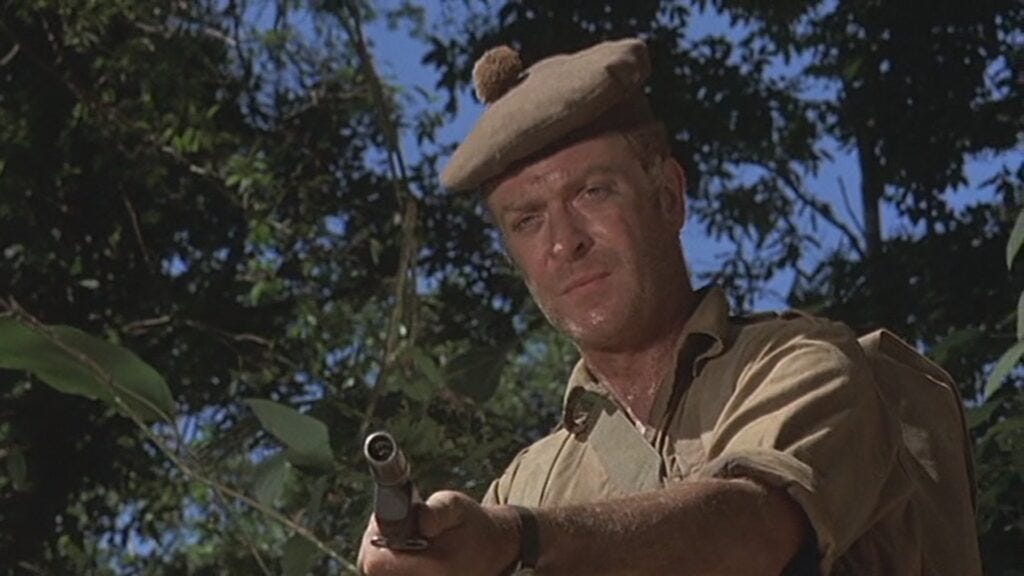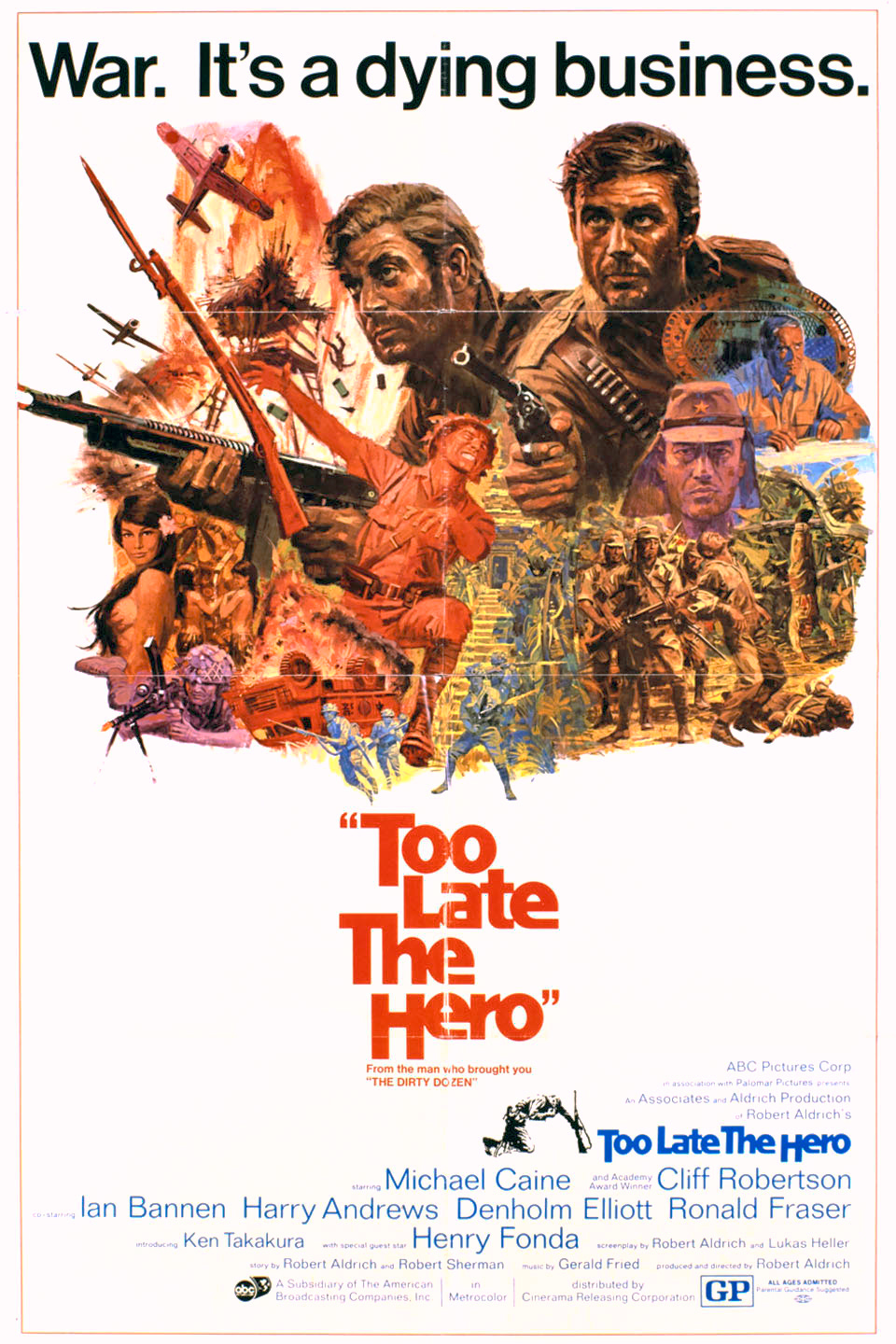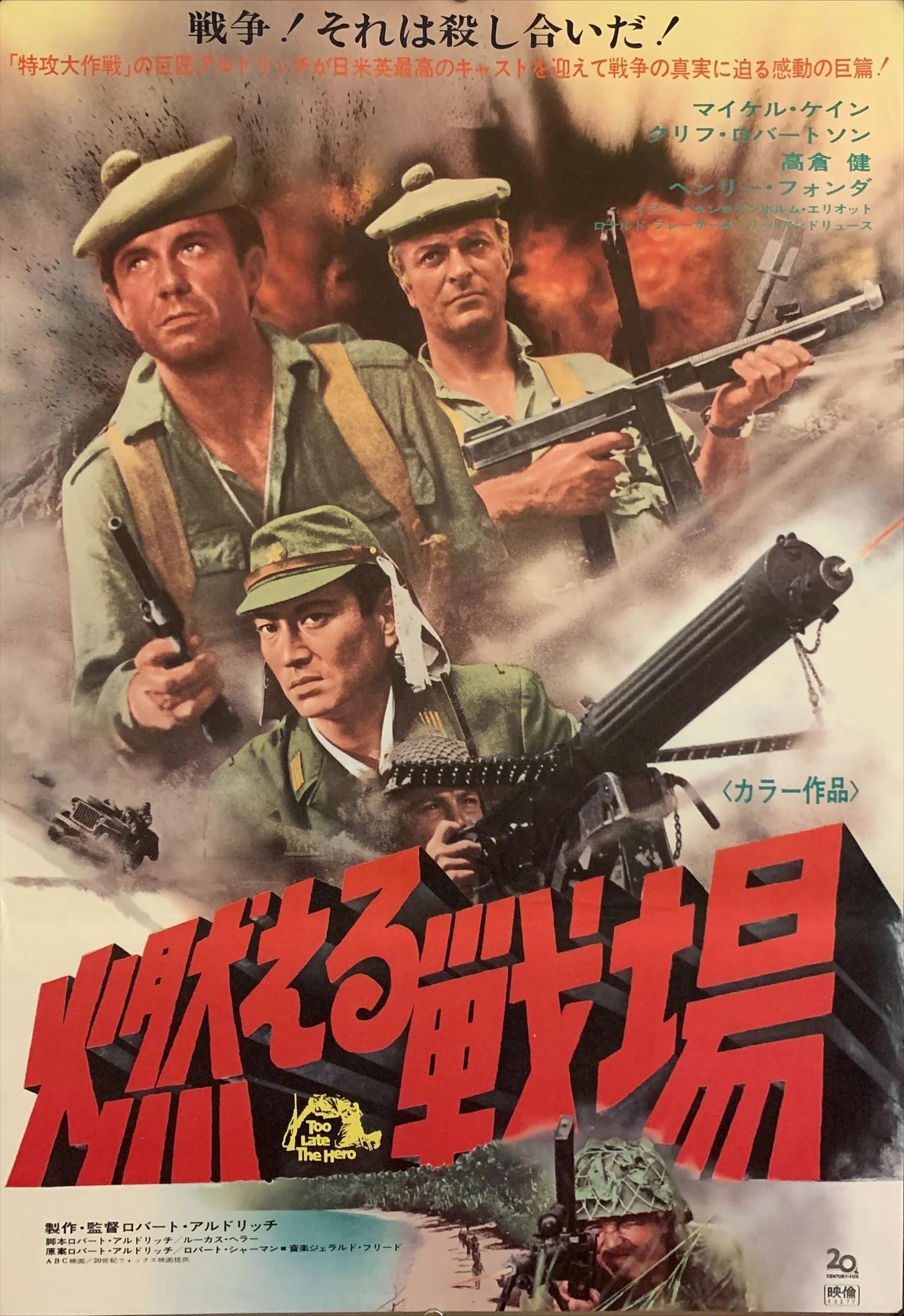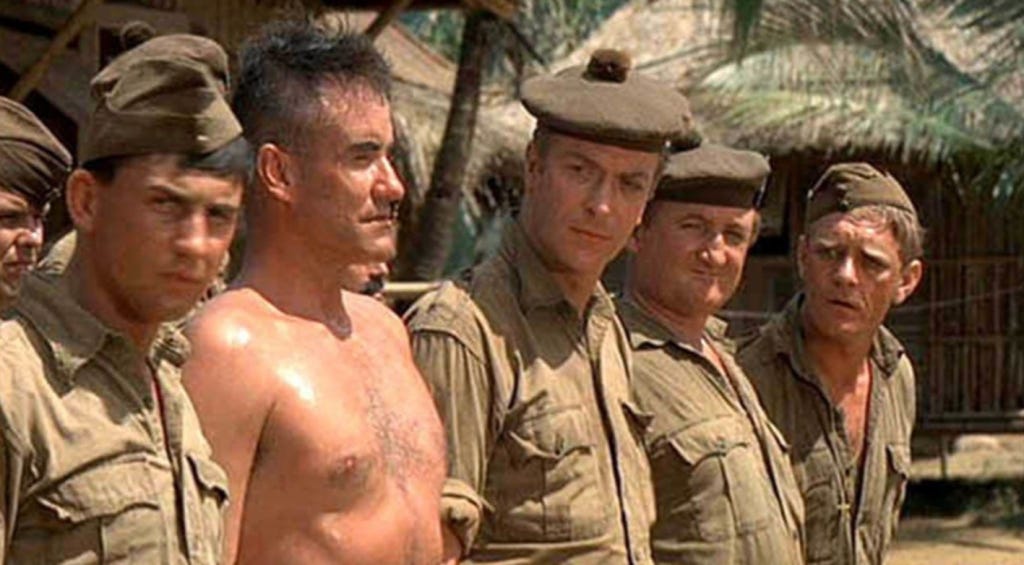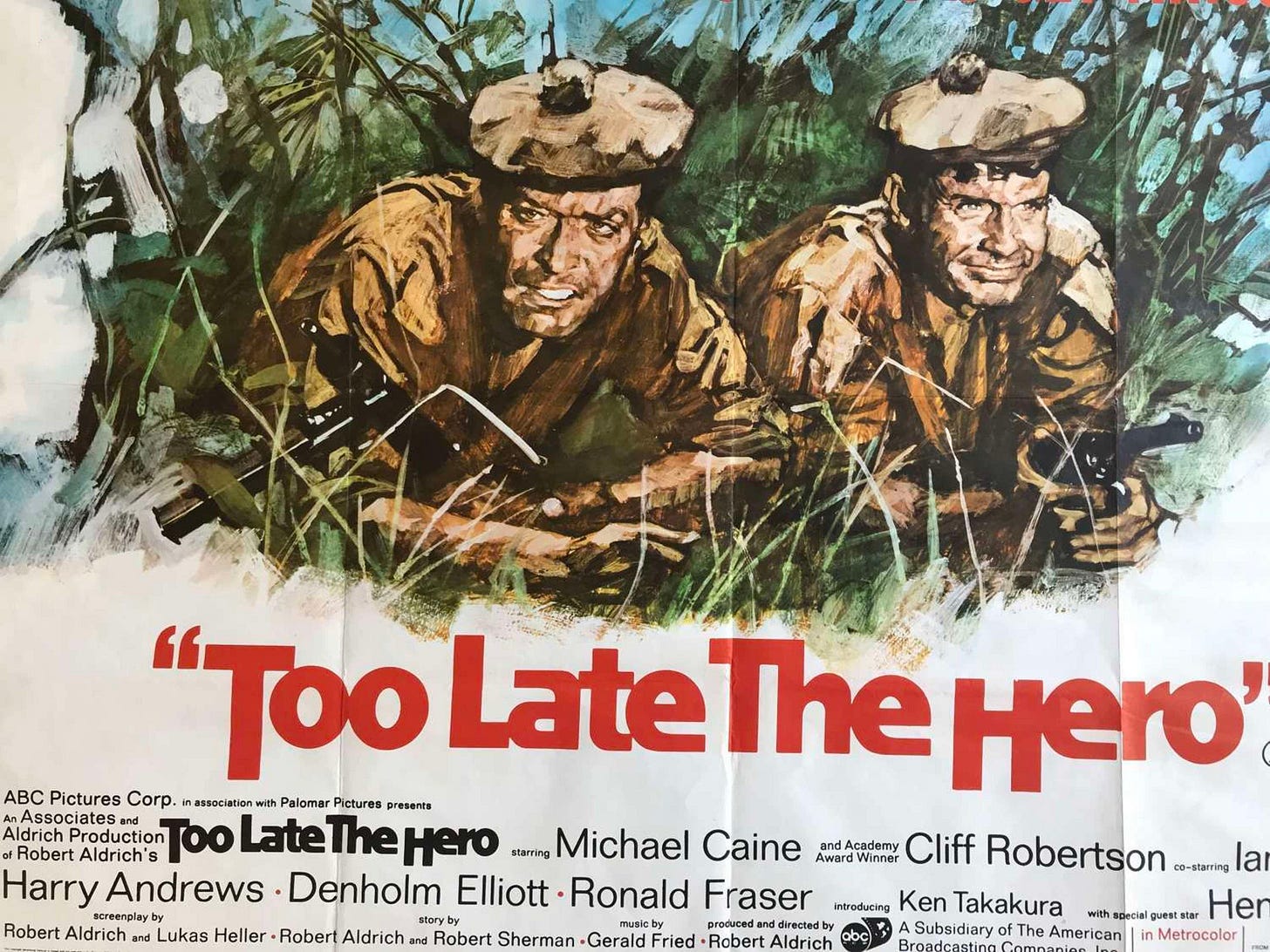A Bit of Film and War: "Too Late the Hero"
Robert Aldrich's forgotten follow-up to "The Dirty Dozen" starring Michael Caine, Cliff Robertson, and Ken Takakura.
A Bit of Film and War is a monthly column series covering war movies. I break down films from the classics to the obscure, detailing what wars they cover and if they’re worth checking out. It’s free for all subscribers to this Substack, but if you enjoy my writing, consider opting for a paid subscription. Doing so will give you access to exclusive in-depth pieces and my entire backlog of work. Your support is greatly appreciated!
Welcome back to A Bit of Film and War, my monthly column series covering the best, the worst, the underrated, and the forgotten of my favorite cinema genre — the war movie. Last time I covered a true classic with Robert Aldrich’s The Dirty Dozen, but our next entry is going in the other direction. Not because it’s a bad film, mind you. Far from it. Yet while Aldrich’s earlier ensemble epic was a huge box office smash when it hit cinemas across the world in 1967, his attempted follow-up in 1970 never saw anything close to that level of success.
Too Late the Hero is a bit of an odd duck. After seeing how much money The Dirty Dozen took in, Aldrich sold his profit participation to MGM and used the funds to start his own studio, The Aldrich Company. This gave him unprecedented creative freedom, but a string of financial duds ultimately lead to his career seeing a notable decline that could not keep up with changing Hollywood trends. One of those unfortunate failures was this film. ABC Pictures wanted Aldrich to do another war picture like The Dirty Dozen and after pulling out an unproduced script that had been written years before, the eventual result was Too Late the Hero.
As this entry of A Bit of Film and War will show, Too Late the Hero has plenty of good ideas and a stellar cast to boot. Whether due to studio interference or its script needing a bit more polish though, it isn’t completely successful in what it attempts to do. I also think that its comparisons to The Dirty Dozen are rather unfounded as both end up being quite different stories. Still, Too Late the Hero is long past due for a critical reevaluation and I would certainly put it into the category of underrated or overlooked.
What’s the film?
Too Late the Hero hit American theaters on May 20, 1970, while the Japanese release arrived less than five months later on Oct. 10. As far as I’m aware, the title is completely original and has somewhat become an idiom like “too little, too late.” The original screenplay was based on an unpublished novel supposedly called Don’t Die Mad written by frequent Aldrich collaborator Robert Sherman, but both titles give a good indication that the story is going to be pretty cynical either way.
Over here the film is known as 燃える戦場 or “The Burning Battlefield” which I suppose is somewhat accurate considering the kind of intense action that takes place, but it does feel a tad generic like most Japanese localizations of war film titles from this era. The Imperial Japanese Army being the antagonists would not have been an issue since such WWII films were already widely accepted by Japanese audiences by the 1970s. In fact, the main selling point was it being the first Hollywood film to star Ken Takakura, one of Japan’s most beloved actors and someone who I don’t think gets enough recognition in the West.
Too Late the Hero ended up with a budget of over $6.2 million, which was a decent amount for the time. On the other hand, The Dirty Dozen was made on $5.4 million and had far more impressive special effects, so I can only assume that most of the money went toward its exhausting shoot in the Philippines. Despite a decent run in British cinemas, Too Late the Hero failed to make a sensation anywhere else and it ultimately lost more than it cost to make.
That lack of initial success is probably the biggest reason why Too Late the Hero has ended up largely forgotten. It received a DVD release in 2004, but that’s it. No Blu-ray and no 4K UHD. It’s not even legally available on streaming anywhere, but as of this writing the full movie is available on YouTube. I suspect that the rights for this one are somewhat of a mess, but as Disney owns ABC Pictures now, the final decision to restore or re-release is likely with them now. The House of Mouse really does have an iron grip on everything these days, doesn’t it?
What’s the war?
World War II and specifically the Pacific Theatre. Other war films like The Bridge on the River Kwai and Letters from Iwo Jima of course have also revolved around the Allies’ war with Japan, but Too Late the Hero is the only one to specifically deal with the epic battles which took place on New Hebrides. Just kidding, there were no battles with the Japanese on New Hebrides.
While both the British and the Americans fought the Japanese on many fronts in the Pacific, this former island colony which is now the modern sovereign nation of Vanuatu was a strategically important base of operations for the Allies from 1942. Too Late the Hero depicts a Japanese invasion of the islands, but no such operation ever took place. The strong Allied presence would have made it impossible for this to happen, while Japan was focused on other areas like the Solomon Islands and Papua New Guinea.
What’s it about?
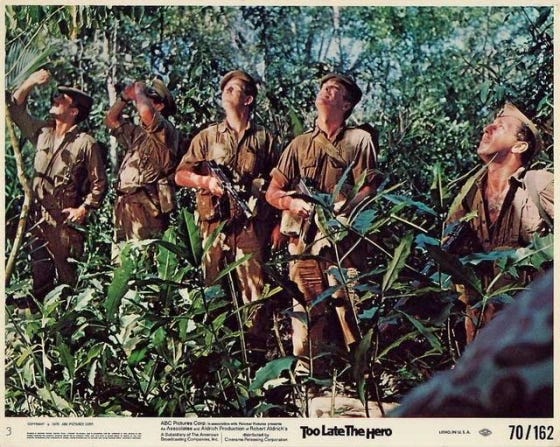
Sam Lawson is a U.S. Army lieutenant who specializes in Japanese language interpretation, but has so far been able to avoid direct engagement with the enemy. Despite looking forward to going on leave, his plans are unexpectedly cancelled after being ordered to report to New Hebrides. With his set of skills, he’s tasked with joining a British infantry commando unit and assisting them on what will be a dangerous field mission against the Japanese.
The British base is surrounded by thick jungle with nearby Japanese soldiers ready to shoot down any soldiers who wander astray. With an American naval convoy scheduled to arrive at the island in three days, the British unit must send fake signals and destroy the Imperial Japanese Army’s radio transmitter to buy the Allies time. Yet Lawson quickly clashes with the leadership and attitudes of the British soldiers he’s forced to work with, causing what was already a risky operation to become a complete disaster. As the men end up dead or captured, it eventually becomes a pure quest for survival — mission objectives be damned.
Who’s the director?

Robert Aldrich, but I’ve already discussed him at length in my last column on The Dirty Dozen, so I recommend checking that out for more context. It should be noted that he directed two films between that one and Too Late the Hero, neither of which I’ve seen. The Legend of Lylah Clare and The Killing of Sister George were both considerable departures from The Dirty Dozen, being subversive dramas instead of war films. Lylah Clare was a critical and commercial disappointment, but Sister George did decent box office numbers and has improved in esteem.
These two films and Too Late the Hero were produced by Aldrich’s own company, which allowed him more creative freedom than working for just one studio. It’s probably for that reason why he was able to create such an eclectic filmography even if most of his post-Dirty Dozen career consisted of flops. Two exceptions were the 1974 prison sports drama The Longest Yard starring Burt Reynolds which earned $43 million against its $2.9 million budget and Hustle released the following year which was also a box office success. Too Late the Hero, however, was the last war film Aldrich would ever make and he shifted into other genres afterward.
Who’s in it?
The cast is easily the best aspect of Too Late the Hero. Cliff Robertson, who younger viewers today pretty much only know for as Uncle Ben in the Sam Raimi Spider-Man trilogy, plays Sam Lawson. This film serves as a decent introduction to his career as it falls in line with the rugged roles and reluctant heroes he often took at the height of his popularity. Lawson is someone who never wanted to take on the mission in the first place, and we first see him in a pretty disheveled state. In a somewhat unrealistic turn midway through, his reluctance disappears and he ends up becoming the strongest moral compass of the story as the British soldiers he’s with are even less willing participants.
Private Tosh Hearne, played by Michael Caine, is the most cynical and compelling character. Performing in his native Cockney accent with heaps of sarcasm for good measure, Caine is in top form here after establishing himself as one of the biggest British stars of the 1960s. His appearance in Too Late the Hero would portend his insistence on taking more challenging roles throughout the 1970s, such as Mike Hodge’s Get Carter and Joseph Mankiewicz’s Sleuth. As one of my favorite actors, I’ve discussed Caine at length in my weekly Bonus Perspectives column before, so expect further write-ups about his work later this year.
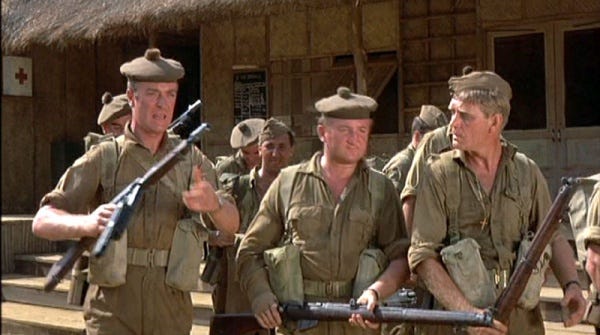
Denholm Elliott, best remembered for Marcus Brody from the Indiana Jones franchise, is the no-nonsense Captain Hornsby. Tasked with leading the British commando unit, most of Hornsby’s decisions prove to be disastrous and he holds little respect among the men. In contrast to Hearne’s Cockney accent, Hornsby speaks with an upper class Received Pronunciation accent, which was quite common among British military higher-ups at the time. This adds an interesting element of class tension between these two men who already despise each other, something that often features in many Michael Caine films.
The other British actors turn in pretty strong performances as well, while Hollywood veteran Henry Fonda makes a brief cameo in the introduction as the U.S. Army captain who briefs Lawson. Apart from them, the other notable player is Ken Takakura as the Japanese antagonist Major Yamaguchi. He’s essentially saved for the final act, but it’s a surprisingly effective villain role. Yamaguchi constantly taunts the commando unit with the tone of a schoolteacher scolding students, but also knows how to skillfully manipulate the Allied soldiers he has captured. It certainly makes you wish ol’ Ken-san received more recognition outside of Japan, but I’ll get into that in the interesting facts section.
The Foreign Perspectives review
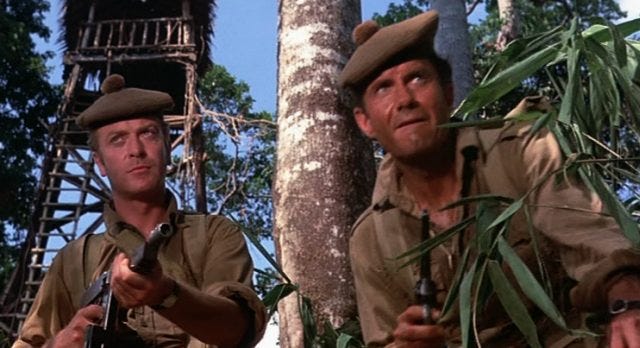
Too Late the Hero on paper has practically everything I could ever want. It’s a film about the Pacific Theatre, something that doesn’t get nearly as much attention in Anglosphere WWII cinema as it should compared to the more well-known European Theatre. It stars Michael Caine, my favorite English actor. It has Ken Takakura as the villain, my favorite Japanese actor. You even get Uncle Ben and Marcus Brody in there too.
I certainly enjoyed Too Late the Hero for all those reasons and more, but enough elements prevent it from being a classic like The Dirty Dozen or The Guns of Navarone. While the basic premise of a British military base being mere miles away from the Japanese forces adds to the overall narrative tension, it only raises the question as to how these men were able to survive in such desolate conditions to begin with. Leaving the base more or less means instant death, so why didn’t the Japanese just launch a full scale attack on the Allies if the terrain gives them an advantage? With how easily these men get cut down, my Japanese wife who was watching the film with me even jokingly asked, “How did we ever lose the war with these guys as our enemy?”
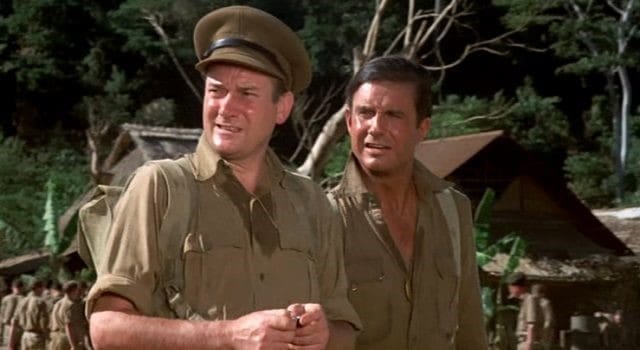
That, however, leads to the film’s biggest problem which is Robert Aldrich attempting to draw parallels to the Vietnam War. The Kent State shootings had occurred just two weeks before Too Late the Hero opened, so opposition to the war in the United States would have been at an all time high. Yet as most will agree, World War II was an entirely different conflict with far less moral ambiguity than Vietnam. At one point, Captain Hornsby even sarcastically compares Lawson to a “long-haired conscientious objector,” but such an awkward reference is a clear anachronism.
Aldrich’s The Dirty Dozen worked far better as an anti-establishment film because its characters were convicts forced into a mission by the U.S. government, which meant that the narrative was about them dealing with limited agency. The reluctance of the characters in Too Late the Hero, however, is nowhere near as convincing. While there surely would have been soldiers who complained, the British Army was famous for its strict discipline during WWII and the behavior seen by these men would not have been tolerated. The vast majority had the understanding that they were enlisted for a reason. As a result, I don’t really consider Too Late the Hero to be a true spiritual successor to The Dirty Dozen despite that many have often tried to categorize it as one.
With those complaints aside, there is still a lot to like about this film. Thanks to its tropical filming location, the viewer convincingly gets the sense that the jungle is a claustrophobic nightmare for the commandos and that their mission is one with a low chance of success. Despite a few slow parts, Aldrich is generally effective in establishing tension and making the action matter when it does happen. Many critics at the time bashed the film for having too little action, but it should be remembered that wars are not always constant fighting. Most of it is actually waiting the enemy out and Aldrich wants audiences to feel that.
I also enjoyed seeing the subtle elements of class tension between the British soldiers. Aldrich being an American provides a fascinating outsider’s perspective, while Lawson serves the role as a more objective observer. All of this is carried by the aforementioned fantastic cast and considering that Too Late the Hero rarely receives much recognition, it’s a shame that most of its performances have gone under the radar. Michael Caine, Cliff Robertson, Denholm Elliott, and Ken Takakura are all top tier. Despite whatever problems the story itself might have, their dedication to the material clearly shows and I was invested because they were too.

I won’t spoil the ending, but I will say that it’s a fitting conclusion to all the cynical themes about heroism and war glory Aldrich presents. The final sequence’s breathtaking camerawork and swift editing keeps the viewer constantly engaged, while it’s intentionally left vague until the very last moment who made it out of the jungle alive. All of it is very impressive considering the strenuous conditions Too Late the Hero was shot under. While you may disagree with Aldrich’s pessimistic worldview, most will agree that he was among the best in his era at telling a thrilling cinematic narrative. There are plenty of thrills to be found here even if takes some time to get there.
Interesting facts
-Speaking of that ending, Too Late the Hero actually has an alternate one for British audiences. No spoilers again, but the biggest difference is around who lives and who dies. As far as I can tell, this British ending has never been preserved outside of its respective theatrical release. Neither the U.S. or U.K. DVD include it, which could suggest that it’s possibly lost media. All the more reason why there really needs to be an updated physical release of this film on Blu-ray or 4K with such material preserved, assuming it still exists.
-Veteran composer Gerald Fried was responsible for the score, an eclectic combination of patriotic military music and Asiatic ambience. Fried passed away in 2023 at the age of 95, leaving behind a huge body of work including TV shows like Gilligan’s Island, The Man from U.N.C.L.E., Star Trek, and Mission: Impossible. The score for Too Late the Hero is unfortunately quite hard to acquire, being only available on a long out-of-print CD.
-“Too Late the Hero” is also the name of a hit 1981 single by English rock musician John Entwistle of The Who fame. It’s a pretty cool new wave song, but it’s debatable if Entwistle was inspired by the movie while writing it. The contemplative lyrics ironically sort of fit the narrative’s themes of hollow victory though (“I’ve just won the war, it was nothing, really”) and I could easily imagine it being a suitable piece for the closing credits.

-As stated previously, the Japanese had no presence in New Hebrides and their role depicted in Too Late the Hero is completely fictional. You won’t find the name New Hebrides on any map today because it’s now the modern island country known as the Republic of Vanuatu. Most aren’t familiar with Vanuatu either, but it’s located 1,750 kilometers away from Australia. New Hebrides was notable for being one of the few colonial territories in history administered by two powers — the British and the French. It later achieved independence in 1980.
-It’s somewhat odd that Aldrich chose this obscure location to set the film while shooting in the Philippines, which was actually occupied by the Japanese for most of the war. Considering that the Allies waged a series of costly campaigns here, there would have been plenty of dark material like the Bataan Death March for Aldrich to draw upon. Perhaps he wanted to focus more on telling an engaging narrative set instead of being bogged down by actual historical details. Either way, consider the events of Too Late the Hero entirely made up.

-Cliff Robertson was not Aldrich’s first choice to play Lawson as he felt that he was not suitable for the role. The studio hired him despite the director’s strong opposition, which could be a reason why the final cut tends to focus more on the British soldiers than Lawson. Both men reportedly had a tense relationship on set and Robertson was particularly annoyed that he could not fly back to the United States to accept his Best Actor Academy Award for the film Charly, which was based on the short story Flowers for Algernon. The precise details of their dislike for one another are not entirely known, but one can assume that their stubborn personalities and contrasting creative visions were the main causes. They had previously worked together in Aldrich’s 1956 drama Autumn Leaves, but Too Late the Hero ended up being their only other collaboration.
-Despite Robertson’s character supposedly being a trained linguist fluent in Japanese, Robertson does not speak a word of the language in the film — not even phonetically as is typical Hollywood practice. There’s a scene where he tries to lure a Japanese soldier out from the trees by mimicking one of his comrades and saying that the enemy has passed, but Robertson is clearly dubbed over by someone else. It’s a pretty terrible effect that sticks out like a sore thumb even to someone who doesn’t know the language, but perhaps the sounds were too difficult for him to pronounce.
-The rest of the Japanese cast, however, is pretty authentic. It seems that the studio did take the effort to hire native Japanese extras to play the roles of the enemy soldiers, when most other films of the era would have used Japanese-Americans or other Asian-Americans who don’t actually speak Japanese. Their presence is generally secondary to the screentime of the British commando unit, but that’s actually one point for historical accuracy. Direct personal encounters with Japanese were relatively rare for Allied soldiers in the Pacific Theatre and jungle warfare was usually conducted at a distance.
-Too Late the Hero was Ken Takakura’s first appearance in a Hollywood production. Already an established veteran in his home country thanks to long-running film series like Abashiri Prison and Brutal Tales of Chivalry, Takakura went on to appear in over 200 works and is primarily remembered for his stoic roles a la Clint Eastwood. It isn’t clear how Takakura came aboard on the project, but Aldrich loved his performance so much that he wanted to work with him again. Their next collaboration was supposed to be The Yakuza which had a much hyped screenplay written by Paul Schrader of Taxi Driver fame.
The Yakuza had a complex production that would require a separate article to fully explain, but Aldrich ended up not working on the film and Sydney Pollack directed instead. This was Takakura’s second Hollywood film, with Black Rain and Mr. Baseball following later. Oddly enough, Takakura did not provide his own voice for the Japanese dub of Too Late the Hero. His fluency in English made him one of the few Japanese actors to break into American cinema and at one point he was even considered to play Mr. Miyagi in The Karate Kid, but that obviously did not pan out. One day I’ll give some of Ken-san’s films a proper write-up.
-As was the case with The Dirty Dozen, quite a few of the cast members in Too Late the Hero had real-life military service. Michael Caine served in the Korean War, which had a profound impact on his worldview. The older cast members were directly involved in WWII. Cliff Robertson was a third mate in the U.S. Merchant Marine, Denholm Elliott joined the Royal Air Force, Harry Andrews was present during the D-Day landings as part of the Royal Artillery, and Percy Herbert survived being a prisoner of the Japanese in Singapore. Despite his age and existing Hollywood career, Henry Fonda famously enlisted in the U.S. Navy to join WWII. He served in both the European and Pacific Theatres for three years altogether. Lance Percival and Ronald Fraser who were both closer to Caine’s age served in Seaforth Highlanders. As of Feb. 2025, Caine remains the only surviving member of the principle cast.

-Being released long before the days of home video, Too Late the Hero came out when most major films received novelizations. This would have been the only real way to revisit the story after leaving the cinema, apart from occasional vinyl record LPs that may have contained movie audio. Novelizations are a pretty dead art of storytelling these days due to films being instantly accessible via streaming and general audiences losing interest in reading, but during the prime of their relevance some of these books provided fascinating expansions of lore and characters. Too Late the Hero is notable because it actually received two novelizations, apparently because the American and British rights were separate.
The British novel by William Hughes is a standard adaptation, while the American novel by Con Sellers is told entirely from the POV of Lawson. Naturally both of these are very little known pieces of literature for an already obscure film. The American version has thankfully been uploaded to the Internet Archive, but the British version to has no digital preservation to my knowledge. I was able to snag a copy off AbeBooks, but it hasn’t arrived yet as of this writing. I plan on reading both and will probably feature my thoughts in a separate piece at some point as I’ve been wanting to review more books on Foreign Perspectives. Film novelizations are a fascinating concept and some even stand strong as their own independent works.
Should you see it?
Yes, even if it’s no masterpiece. For all its flaws, Too Late the Hero is still a thoroughly enjoyable war movie that’s carried by strong performances and an interesting jungle setting. Aldrich might get caught up too much at times in trying to draw parallels to the Vietnam War while some of the premise stretches the limits of credibility, but the production does show the characteristics that made him such an acclaimed auteur. It’s frankly miraculous that despite its difficult production, the film turned out to be as entertaining as it is.
The Dirty Dozen is certainly the superior war picture, but Too Late the Hero should be viewed less of a spin-off or spiritual sequel and more of its own thing. In retrospect, it feels very much like a transitionary work from the standard formula of many 1960s war films into the harder edge of the 1970s when restrictions on violence were being lifted. What a shame though that Too Late the Hero has fallen through the cracks into obscurity. It may not be quite worthy of a Criterion Collection release, but some distributor like Arrow Video really should get on restoring this underrated work so it has a life beyond low quality YouTube uploads. I can confidently say that Too Late the Hero deserves far better than the initial tepid reception it got 55 years ago.
